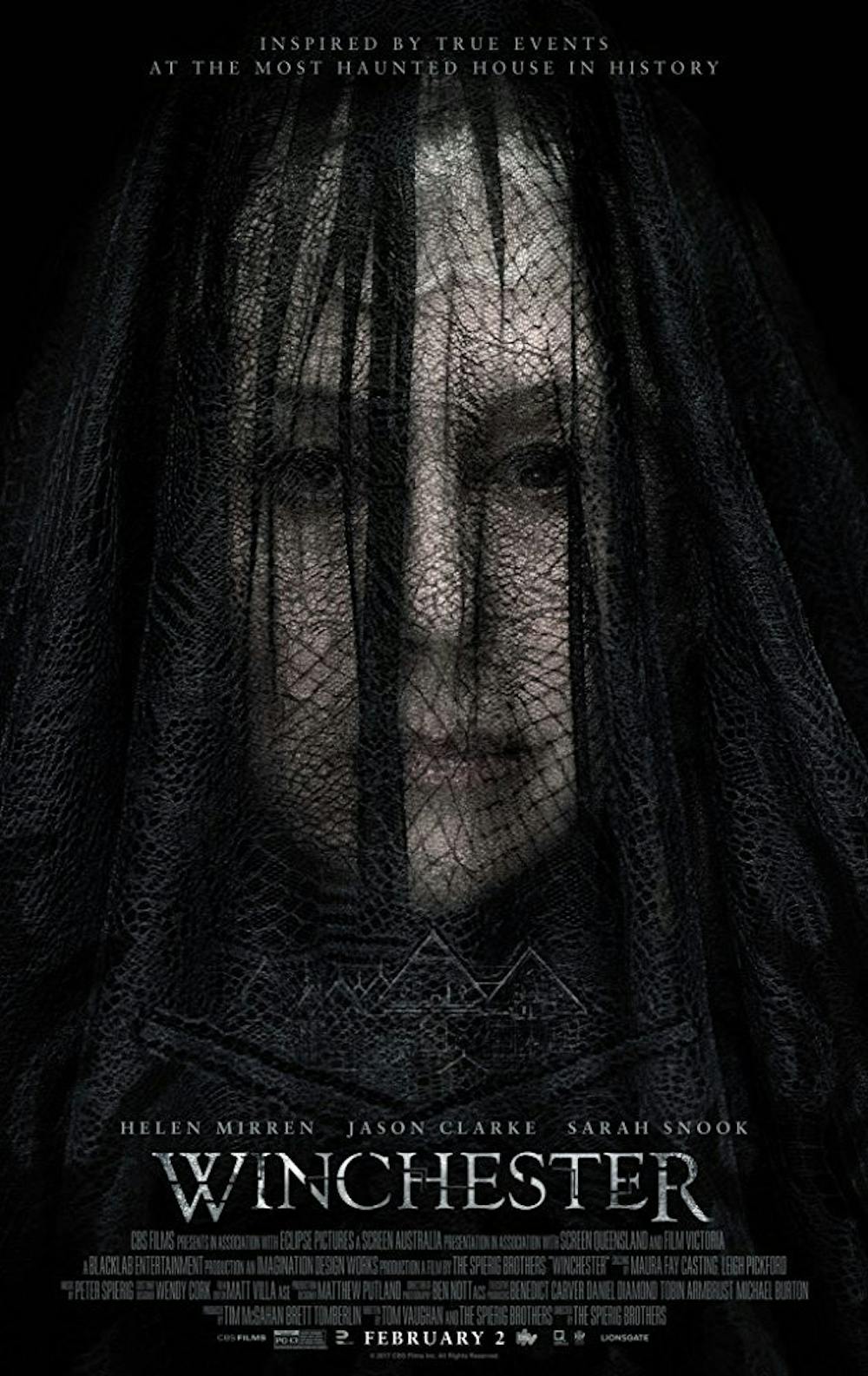Helen Mirren has proved that she has major acting chops time and time again. Her illustrious 50-year career has earned her much more than four Academy Award nominations — and one win, which came in 2006 for her portrayal of Queen Elizabeth II in the film “The Queen.” She was made a Dame Commander of the Order of the British Empire in 2003, and thus carries a regal reputation that commands respect.
It comes as a surprise, then, that her most recent role has her leading the cast of “Winchester,” the newest cliché horror flick to grace the big screen.
The movie revolves around the fascinating life and home of Sarah Winchester (Mirren), heiress to the lucrative firearms empire that was the Winchester Repeating Arms Company. Despite her massive wealth and role as owner and leader of the company, Winchester is best remembered for her house, which she kept under constant renovation. The mansion — known today as the Winchester Mystery House — is a 160 room, 24,000 square foot house that stands in modern day San Jose, California.
The Winchester Mystery House earned its name for a multitude of reasons. The layout is best described as maze-like, boasting everything from staircases that lead to nowhere to doors that masquerade as wardrobes. Adding to the allure of the mansion is Sarah Winchester’s eccentric spiritualism. Believing she was cursed, many claim that Winchester started constructing the mansion as an attempt to satiate the spirits of those killed by Winchester-branded rifles.
“Winchester” could not have been any more set up for success. The undeniable truth of the existence of Sarah Winchester and her crazy home combined with the recognizable reputation of Helen Mirren should have been enough to provide audiences with a memorable horror movie experience. Instead, directors Peter and Michael Spierig put forth a script so corny not even Mirren’s expertise could save it.
The movie is laughably cliché. The first shot of the movie is of a young boy sleeping peacefully in his bed in a room lit by rosy candlelight — that is, until a mysterious gust of wind blows out the candles. This is probably the single most cliché horror movie beginning in all of history. In the year 2018, no audience classifies a gust of wind in a room with no open windows or doors to be even particularly revolutionary.
The script only devolves from there. In the next scene, psychologist and drug abuser Dr. Eric Price (Jason Clarke) is called upon by the lawyers of the Winchester Repeating Arms Company to evaluate the mental fitness of Sarah Winchester. The scene is excruciatingly expository. Audiences are forced to watch head lawyer Arthur Gates (Tyler Coppin) literally reveal the entire plot in his dialogue. One wonders if the directors have ever heard of the most important rule of storytelling — show, don’t tell. There is so much exposition in this movie — particularly during the scenes in which Mirren’s character is one-on-one with Dr. Price during psychological evaluations — that viewers could easily leave to get a popcorn refill and miss none of the actual plot.
Speaking of plot, this one is more riddled with holes than the ghostly victims of the Winchester rifle. Firstly, Dr. Price was supposedly shot in the chest by his mentally ill wife — who used a Winchester, of course — died for three full minutes, and then woke up completely unharmed with no lasting repercussions. He was shot in his greenhouse, in the privacy of his own home, died, and then came back to life. In 1906? The first defibrillator was invented around the 1920s, and mouth-to-mouth resuscitation wasn’t perfected until the 1960s.
These discrepancies plague the main plot of the film as well. The Winchester House falls victim to a deadly spirit named Ben Block attempting to avenge his brothers, who died of bullet wounds from Winchester guns. While this may make sense on the surface, comprehension becomes lost when it is revealed that his brothers were Confederate soldiers who died in battle. Why, then, is Ben’s anger directed at the Winchester family? Because, as Mirren says in a dramatically delivered line, “Confederate arms were no match for the Winchester rifles of the Union Army.” So if the guns were any other brand, this entire movie wouldn’t exist.
Additionally, Ben’s character is crafted in a highly predictable form. He seems to be a butler under the employment of Mrs. Winchester, but towards the end — spoiler alert — he is revealed to have been dead the whole time! No one could have possibly guessed that from the fact only Dr. Price, who has an intimate understanding of death, talks to him for the entire movie.
The storyline as a whole has faint anti-gun violence leanings, which Mirren says was the intention. In an interview with Germain Lussier of io9, “There was a line [...] relating to ‘It’s evil to profit from the sale of armaments and arms,’” Mirren said. “I felt that had such resonance.”
But the fact that Block’s brothers were killed while fighting in a war they volunteered to fight in doesn’t fit this “innocent victims of gun violence” narrative. If his brothers had been killed by someone wielding a large stick, would Block declare war on the forest? If they had been starved to death, would he haunt a grocery store?
Although the film attempts to mask the gaping plot holes with jumpscares, the movie leaves more questions than answers — and not in a thoughtful, deeply resonant way. Audiences will likely leave the theater more confused than scared. Overall, “Winchester” is unsurprising, annoying and just plain silly. The true mystery of this thriller lies in who edited this script and let it go into production at all.





